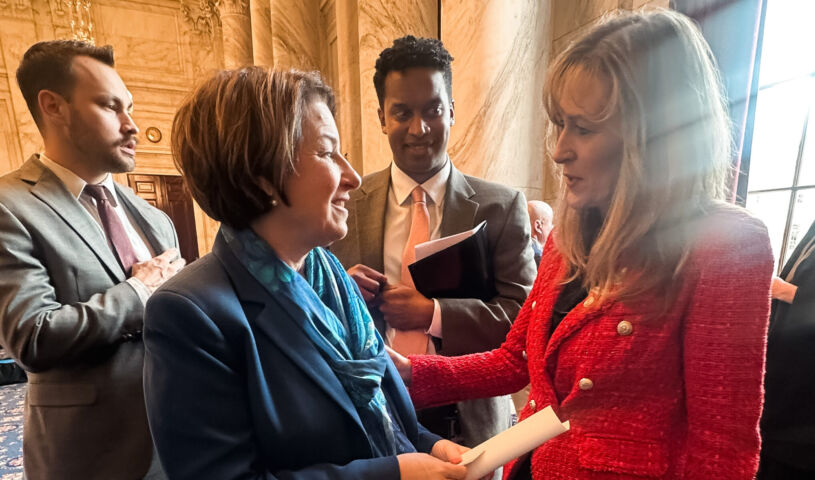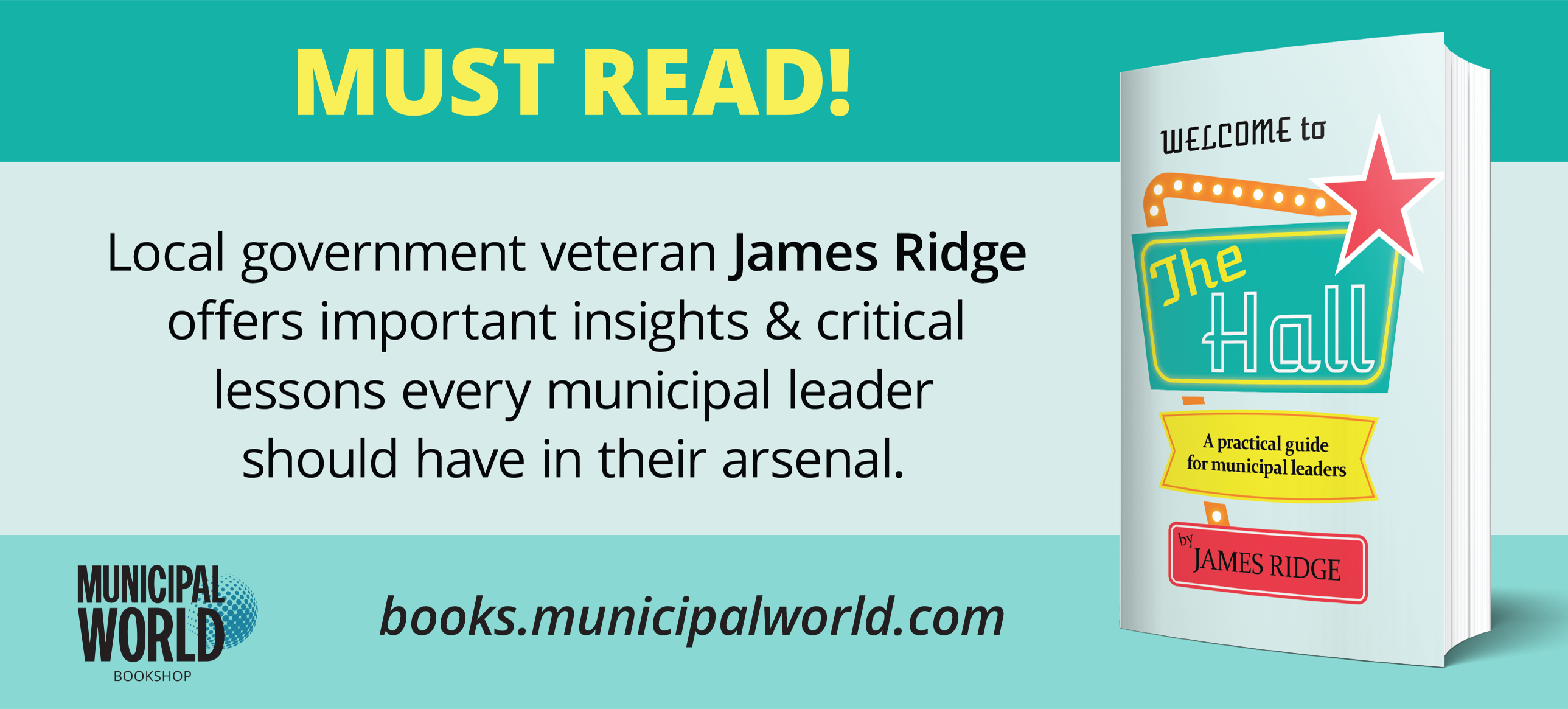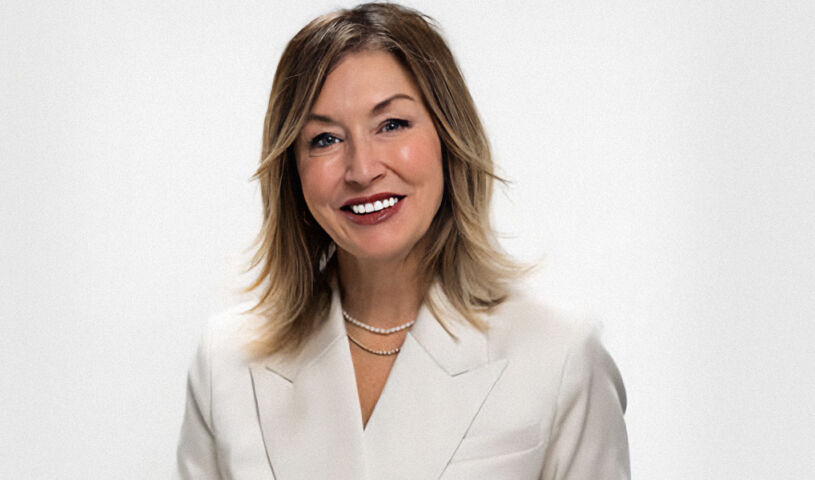Burlington mayor sees positives in tariff fight, but a long road ahead
 Burlington Mayor Marianne Meed Ward (right), discusses the impact of U.S. tariffs with Minnesota Senator Amy Klobuchar during a recent visit to Washington, D.C. Photo: Marianne Meed Ward
Burlington Mayor Marianne Meed Ward (right), discusses the impact of U.S. tariffs with Minnesota Senator Amy Klobuchar during a recent visit to Washington, D.C. Photo: Marianne Meed Ward
For months, municipal officials have visited the U.S. to discuss the impact – on both sides of the Canada-U.S. border – of President Trump’s proposed 25 per cent tariffs.
Burlington Mayor Marianne Meed Ward has been among those officials. This includes a trip to Washington, D.C. last month where she was speaking as part of the Great Lakes and St. Lawrence Cities Initiative. The initiative is a bi-national coalition that works with federal, state, and provincial governments to advance the protection and restoration of the Great Lakes ecosystem.
But as one might expect, much of the conversation at this gathering was focused on the tariff situation between Canada and the United States.
Thankful and Apologetic
Meed Ward describes the talks as “actually very encouraging.” Going into the talks, Meed Ward said it was tough to know what to expect from their counterpart mayors on the other side of the border. After all, it was difficult to know what they were going to say or how they were going to respond to the situation.
But as it turned out, Meed Ward said, they were “overwhelmingly welcoming and also apologetic for the chaos.” They don’t like the uncertainty, Meed Ward said, any more than Canadians do.
Even people who may be sympathetic to the principle of tariffs, Meed Ward said, agreed that there are better ways to negotiate – or renegotiate – a trade deal. This would be, she said, instead of the current “are we doing this and then no, we aren’t we doing this” approach to the situation.
“That chaos for everyone on both sides of the border is unhelpful. You find a common cause on these things,” Meed Ward said. “There is no dispute among any of us. The power of this group is to speak with one voice, across partisan lines and across borders, that a 25 per cent blanket tariff is destructive to both countries and is destructive to a region that is a major economic driver of wealth in both our countries.”
Protecting an Economic Superpower
The Great Lakes and St. Lawrence Cities Initiative was created to build bridges of friendship between mayors and communities on both sides of the Great Lakes-St. Lawrence region.
To put the area’s significance into focus, Meed Ward said if the Great Lakes-St. Lawrence region were a country, it’s US$6 trillion of economic value would make it the third largest country in the world. Meed Ward describes it as a “critically important” trading region.
The initiative also wants to protect the ecology and health of the water system. The initiative focuses on both economic well-being, such as tourism, fishing, recreation, and cross-border trade, as well as the ecological health of the region.
“If your lake is polluted, there’s no fishing, and if there’s no fishing, there’s no tourism, and if there’s no tourism, there’s no economy,” Meed Ward said. “These things are very intertwined.”
Tariffs Dominate the Conversation
Canadian and American officials discussed urging the U.S. Congress to maintain $500 million annually for the Great Lakes Restoration Initiative, which is crucial for the region’s ecological health. They also supported their American counterparts in warning of the dangers of federal funding cuts. These cuts could threaten significant infrastructure projects that are essential for supporting the economy, tourism, and the health of the Great Lakes.
But it was the tariff conversation that dominated the discussions. Those conversations, Meed Ward said, were about arming U.S. officials with facts. Those facts, she explained, would be used to hopefully pressure officials at the state and federal level around the real impacts that tariffs will have, not just in Canada, but in the United States, too.
After all, Meed Ward said it comes down to almost a neighbourhood level conversation. The reality of if this cut happens, and if that tariff goes in, is that constituents will be hurt and various officials might lose their seat. And if they lose their seat, the government might lose the House if enough of those seats are lost.
“That’s the value of the facts. And it’s like anyone, people have to see how they’re going to be affected to understand why they should care and do something differently,” Meed Ward said. “So, we made that case, with facts, but we made that case very specifically armed with information around how it was going to affect the voters – depending on who we were meeting with – in Republican and Democratic districts.”
Municipal Leadership Paying Off
Burlington, along with many other municipalities like Brampton, Toronto, and London, have taken steps to defend their local economies. Most often it has meant municipalities focusing on crafting various buy local and buy Canadian initiatives. These plans often encourage residents to focus on Canadian-made goods and services.
In Burlington, Meed Ward said the city also created a Buy Canadian webpage. This platform serves as a one-stop resource for residents to learn about local products and services.
This has happened, she explained, because municipalities are “fairly nimble as governments go.” As a result, they have been able to jump into buy Canadian initiatives, address their own procurement processes, and do so within a matter of days and weeks.
“If we just direct our significant procurement power to support local industry, that’s very significant support without any additional cost to the taxpayer,” Meed Ward said. The value of procurement, collectively in Ontario, is about $25 billion a year, she added while quoting an Association of Municipalities of Ontario report. “That’s a lot of stimulus power. So, let’s support local.”
Voice of the People
Supporting local seems to go both ways, at least in Burlington. Mead Ward can often be found visiting coffee shops, grocery stores, and community centres, just to hang out for a couple hours and chat with residents.
That’s what she was doing recently when someone came up to her and thanked her for what she, and the municipality, are doing around tariffs. This person thanked Mead Ward for speaking on behalf of her constituents, as well as going to Washington to represent them in these important bilateral conversations.
It was a response that Mead Ward admitted doesn’t always go that way. But it is also one that more people are doing as the tariff conversations have intensified.
“They see the city has a role to play in the ways that we’re looking at the property tax deferrals and interest-free property tax development charge and permit deferrals. They see there’s a role for the municipality to play,” Mead Ward said. “They also see this is an all-hands-on deck situation. Everybody can do something. And so I’ve had a number of people just saying thank you for doing what you can in your way to help.”
Path that Lies Ahead
Trump was expected to announce reciprocal tariffs on April 2. These tariffs aim to match the rates imposed on U.S. goods by other countries, including Canada. But Trump has hinted at possible exemptions for certain countries and sectors, which Mead Ward said furthers the confusion.
Still, Meed Ward said there remains a possibility, either on or after April 2, that the tariff situation could be settled. If, as some speculate, Trump is trying to put the Americans in a better position to renegotiate the Canada-United States-Mexico Agreement (as it’s called in Canada). If that is so, then Mead Ward said the expectation would be that this all takes place “in the right way.”
At that point, Canada will listen, while having its own asks, of course. But that would be the best-case outcome – aside from tariffs just being permanently set aside.
Mead Ward said she has spoken to many people over recent weeks who agree that even if there are no tariffs, even if all this chaos goes away in a couple of weeks, Trump is still the U.S. president for the next four years. And what is clearly agreed upon by even his strongest supporters is that the U.S. president is unpredictable. Unfortunately, stock markets don’t like uncertainty. And so the damage that has been done is going to take a lot of time to fix. If it even can be.
“I don’t know if we’re going to be fully out of that uncertainty until there’s a new administration. And even then, we don’t know who the next one is,” Mead Ward said. “But what we do know is that we’re in for this uncertain ride for the next four years. While we all absolutely want the tariffs gone and for us to get back to some normalcy … I would say, on both sides of the border, it is going to take longer to come back.” MW
✯ Municipal World Executive and Essentials Plus Members: You might also be interested in Jeff Fielding and Dr. Kate Graham’s article: Challenging times call for proactive strategies.
Sean Meyer is digital content editor for Municipal World.
Related resource materials:



